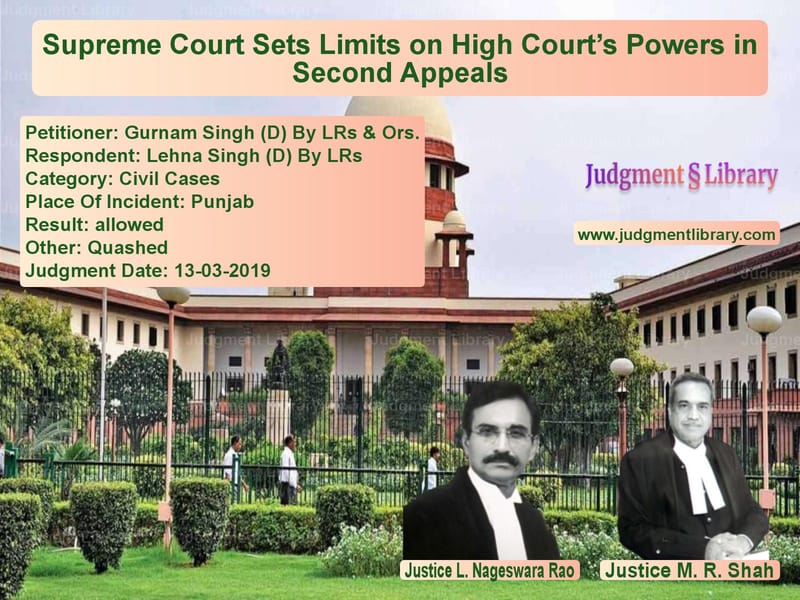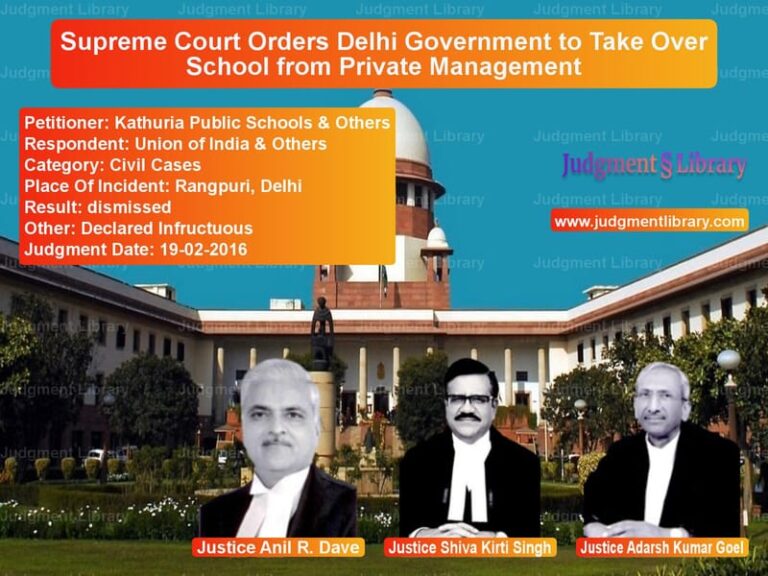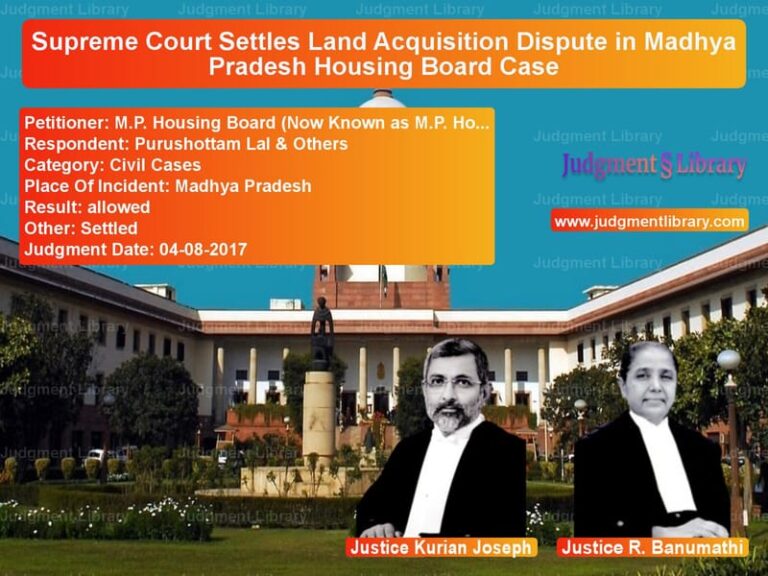Supreme Court Sets Limits on High Court’s Powers in Second Appeals
The Supreme Court of India in Gurnam Singh (D) By LRs & Ors. vs. Lehna Singh (D) By LRs has clarified the legal position regarding the powers of High Courts in deciding second appeals under Section 100 of the Civil Procedure Code (CPC). This judgment is significant for property dispute cases, especially those involving succession and contested wills.
Background of the Case
The case originated from a dispute over land ownership following the death of Bhagwan Singh, a landowner from Punjab. The respondent, Lehna Singh, claimed to be the sole legal heir of Bhagwan Singh, asserting that the land rightfully belonged to him. The appellants, Gurnam Singh and others, argued that Bhagwan Singh had executed a will in favor of them.
The trial court ruled in favor of the respondent, granting an injunction preventing the appellants from taking possession of the land. However, the first appellate court reversed this decision, upholding the validity of the will. The case then proceeded to the Punjab and Haryana High Court in a second appeal, where the High Court reinstated the trial court’s decision, setting aside the first appellate court’s ruling.
Key Legal Issues
The Supreme Court was called upon to address the following key legal questions:
- Whether the High Court was justified in re-evaluating the evidence in a second appeal under Section 100 CPC.
- Whether the first appellate court’s ruling was legally sound and based on proper reappreciation of evidence.
- Whether a will executed in favor of the appellants was valid, given the allegations of coercion and suspicious circumstances.
Petitioner’s Arguments (Gurnam Singh and Others)
The appellants made the following arguments:
- The first appellate court had properly examined the facts and found the will valid.
- The High Court exceeded its jurisdiction by re-evaluating factual findings, which is not permitted in a second appeal under Section 100 CPC.
- The trial court had wrongly disregarded the will without proper legal justification.
- There was no substantial question of law framed by the High Court before deciding the second appeal, making the ruling procedurally flawed.
Respondent’s Arguments (Lehna Singh and Others)
The respondents countered with the following points:
- The will was executed under suspicious circumstances, including discrepancies in the testator’s condition at the time.
- The High Court was correct in reviewing the case since the first appellate court had erred in disregarding key evidence.
- The trial court’s decision was based on a proper evaluation of facts and should have been upheld.
- The appellants’ claim of procedural error was unfounded because the High Court’s decision was based on substantial legal questions.
Supreme Court’s Observations
The Supreme Court ruled that the High Court had exceeded its jurisdiction under Section 100 CPC. It noted:
“Under Section 100 CPC, the High Court’s jurisdiction is limited to substantial questions of law. It cannot reappreciate evidence or substitute its views over those of the first appellate court.”
On the validity of the will, the Court observed:
“Suspicion alone is not sufficient to reject a will. The first appellate court had rightly evaluated the evidence and held the will valid. The High Court erred in setting aside these findings.”
The Court further stated:
“The role of the second appellate court is to examine legal errors and not to act as a fact-finding body. The High Court wrongly reassessed evidence instead of focusing on legal principles.”
Final Judgment
The Supreme Court ruled as follows:
- The Punjab and Haryana High Court’s judgment was set aside.
- The decision of the first appellate court, which upheld the validity of the will, was reinstated.
- The second appeal under Section 100 CPC was dismissed.
The Court concluded:
“High Courts must strictly adhere to the limitations set forth in Section 100 CPC. Re-evaluating evidence is beyond the permissible scope and can only be done in exceptional circumstances involving grave legal errors.”
Implications of the Verdict
This ruling has far-reaching consequences for civil litigation in India:
- Strict Limitations on High Courts: High Courts cannot re-examine facts in second appeals unless there is a substantial question of law.
- Clarity on Will Disputes: The judgment reaffirms that wills cannot be rejected based on mere suspicion; clear legal criteria must be met.
- Ensuring Finality of Appellate Decisions: First appellate courts’ findings will carry significant weight unless there is a fundamental legal error.
- Judicial Discipline: High Courts must frame substantial questions of law before intervening in second appeals.
By reaffirming the scope of Section 100 CPC, the Supreme Court has set a precedent that will ensure consistency and discipline in the appellate process.
Petitioner Name: Gurnam Singh (D) By LRs & Ors..Respondent Name: Lehna Singh (D) By LRs.Judgment By: Justice L. Nageswara Rao, Justice M. R. Shah.Place Of Incident: Punjab.Judgment Date: 13-03-2019.
Don’t miss out on the full details! Download the complete judgment in PDF format below and gain valuable insights instantly!
Download Judgment: Gurnam Singh (D) By vs Lehna Singh (D) By L Supreme Court of India Judgment Dated 13-03-2019.pdf
Direct Downlaod Judgment: Direct downlaod this Judgment
See all petitions in Succession and Wills
See all petitions in Property Disputes
See all petitions in Specific Performance
See all petitions in Judgment by L. Nageswara Rao
See all petitions in Judgment by Mukeshkumar Rasikbhai Shah
See all petitions in allowed
See all petitions in Quashed
See all petitions in supreme court of India judgments March 2019
See all petitions in 2019 judgments
See all posts in Civil Cases Category
See all allowed petitions in Civil Cases Category
See all Dismissed petitions in Civil Cases Category
See all partially allowed petitions in Civil Cases Category







